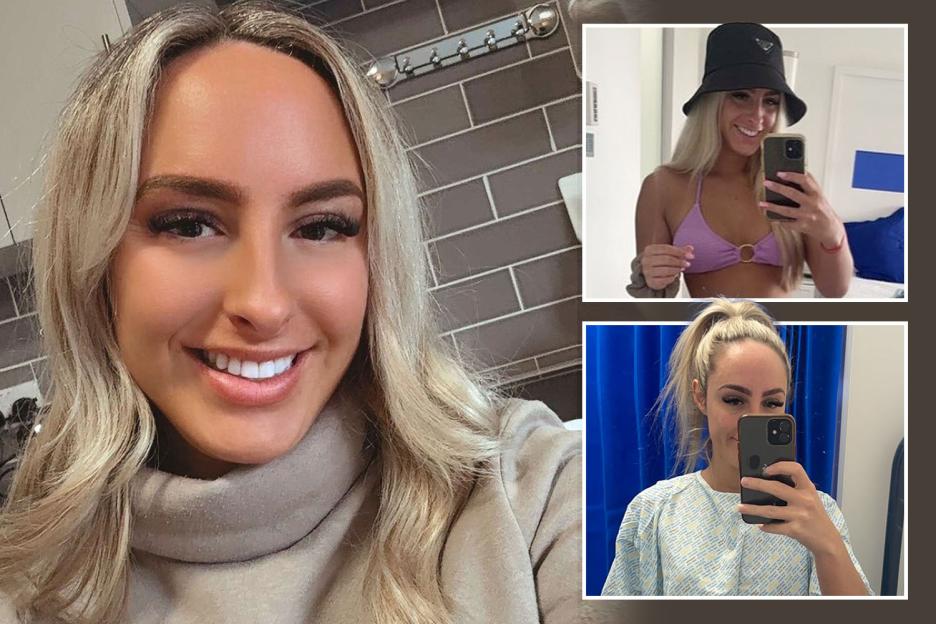Women’s health topics are more than three times more likely to be blocked on social media than men’s, according to a study.
Posts are less likely to be viewed or engaged with due to algorithms, but the opposite is true about
 Women may not be seeing posts about their health, as Instagram blocks them, a study suggests
Women may not be seeing posts about their health, as Instagram blocks them, a study suggestsInfluencer Aly Boghici [ allmumstalk ] and her husband Justin [ alldadstalk ] shared content about male and to see the reaction from followers.
Aly shared content about , and â these types of posts were viewed by 66 per cent fewer non-followers than her typical activity.
By comparison, when Justin posted about , leaking after sex and imbalance, he only noticed a mild drop in non-follower views, by 16 per cent, compared to his normal content.
It suggests women’s health and sexual wellness content is being routinely restricted on social media platforms as outdated algorithms detect words like ‘vagina’ or ‘period’ and block non-followers from viewing.
Engagement rates between posts were significantly different, with Aly receiving a massive drop in comments by 69 per cent, whereas Justin received an uptick by 76 per cent as both followers and non-followers expressed interest in men’s health topics.
Hygiene and health company Essity, which produces menstrual health brands Bodyform and Modibodi, commissioned the experiment.
It is campaigning to end the practice of companies banning medically and anatomically correct terminology related to women’s health.
Aly Boghici said: “It is clear my content is being censored and I can see clearly that the censorship of women’s health related content is an issue.
“I have identified these following topics results in my posts receiving less engagement: menstrual health, charities supporting menstrual health, sexual health or charities supporting these important conversations, and the list can get longer.
“I might be reluctant to post about these important issues moving forward as the message doesn’t seem to be supported unless more support from the algorithms will be given, and people to be given a chance to voice their personal experiences, otherwise we cannot make a change and support women going through different health scenarios... we cannot break taboos if we keep silent .”;
Additional posts during the experiment by Aly focussed on periods, and â which saw 25 per cent less views.
Taboo topics such as and had 14 per cent less views than normal content.
Justin posted about taboo topics such as , weird discharge and thrush.
It doesn’t feel fair that one gender appears to be disproportionately censored when it comes to sharing information about health.
Justin Boghici Influencer
They saw a massive surge, with 34 per cent more non-followers viewing the content compared to his other activity.
His posts illustrating learnings about penile, testicular andexperienced an increase in non-follower views by four per cent.
Justin Boghici said: “After one week of comparing notes, I noticed no notable change in engagement on my posts on male health issues, if anything, they’ve actually increased, especially on the reel message.
“It was quite interesting to make this men’s vs women’s health comparison.
“It doesn’t feel fair that one gender appears to be disproportionately censored when it comes to sharing information about health.”;
The experiment comes as research of 4,000 adults found 47 per cent of those who use social media feel it is an important platform to educate themselves about health and wellbeing.
And 45 per cent don’t believe any restrictions should be placed on posts containing the correct medical or anatomical words and phrases to describe the human body.
Some 44 per cent think anyone should be able to publish content related to women’s health, for example, menstrual health or breast cancer.
Just under eight in 10 adults (77 per cent) said words like ‘vagina’ or ‘periods’ should not be restricted on social media when used in an educational context.
Essity is working with campaign group CensHERship to raise awareness about the negative impact of women’s health censorship on social media.
Spokesperson Kate Prince said: “Our Bodyform brand is regularly censored when it launches new campaigns on social media that are designed to improve education around menstrual health.
“Women and girls must be able to access information and advice about critical health topics on social media and they should be able to hear about and engage with the experiences of others.
“We can fully understand the need to monitor certain words and phrases, but when anatomically and medically correct language is censored then we think it’s going too far.
“We’re asking the social media giants to use their expertise and offer a solution that would help millions of women and girls gain access to important content and information.”;







